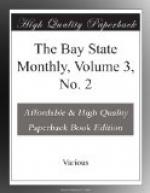“Good morning,” he said with a bow. His expression had changed from the sneer it had worn as he stood in the shadow covertly watching Archdale’s face. “Friends, is it not?” he added, and he smiled and held out his hand tentatively. His host hesitated in the least, then took it. He had been obliged to remind himself first that instinct was not an autocrat of one’s manners. Edmonson perceived the hesitation, slight as it was, and the shadow in his heart sprang up and darkened his face for a moment. Then he gave a short laugh, and turned toward the sunshine. “That’s right,” he said; “let us part on good terms; it’s luck, not I, that you find against you.”
“It was about this very thing that I was waiting here to speak to you this morning,” returned Stephen. “I was going to beg you to remain until we can look into things a little; you, and my father, and I, you understand? It can be done more conveniently here than anywhere else,—and I trust I need not assure you that you are welcome. Of course, I don’t pretend to like the turn of affairs.”
“Not necessary,” interposed the other, the covert impertinence under his frank smile making Archdale flush, and return haughtily:
“I was merely going to say that we must accept with the best grace possible the consequences of things that happened so long before our day.”
“This philosophy is delightful on your lips. As for myself, I shall not find that acceptance of the situation makes any demand for philosophical endurance.”
He tossed his head a little as he ended in amusement at having finished his opponent at the same time as his speech.
“Perhaps that is well,” returned Archdale quietly. “Then it is settled that you stay a few days longer with us?” he added.
“Thank you. I shall be happy to do so. When you need me, I am at your service; for you will find that I have proofs enough to be satisfactory. I have not considered that my unsupported word would be taken as sufficient guarantee in a case like this, where, you know, incredulity is so desirable.”
“Yes, Master Edmonson, I confess, where incredulity is so desirable. Well, then, after breakfast I shall be obliged to trouble you.”
“Thank you,” answered Edmonson, marching off immediately. “I think Lady Dacre is in need of my services. She is struggling with a rose that has climbed up out of her reach, and her husband has disappeared altogether; he is probably assisting Madam Archdale. These husbands are not in the right place, you see.” With which Parthian arrow he disappeared, and was soon filling Lady Dacre’s hands with her coveted treasures.
Archdale watched him a few moments noticing his easy movements and his air of assurance.
“Impudent fellow,” he muttered, setting his teeth, “to speak to an Archdale in that style. I can’t believe him. I shall have Allston examine his proofs; he has a hawk’s eye for flaws. But there’s the likeness. Yes, his story may be true; but the man has the making of a knave in him, if the work is not done already.”




